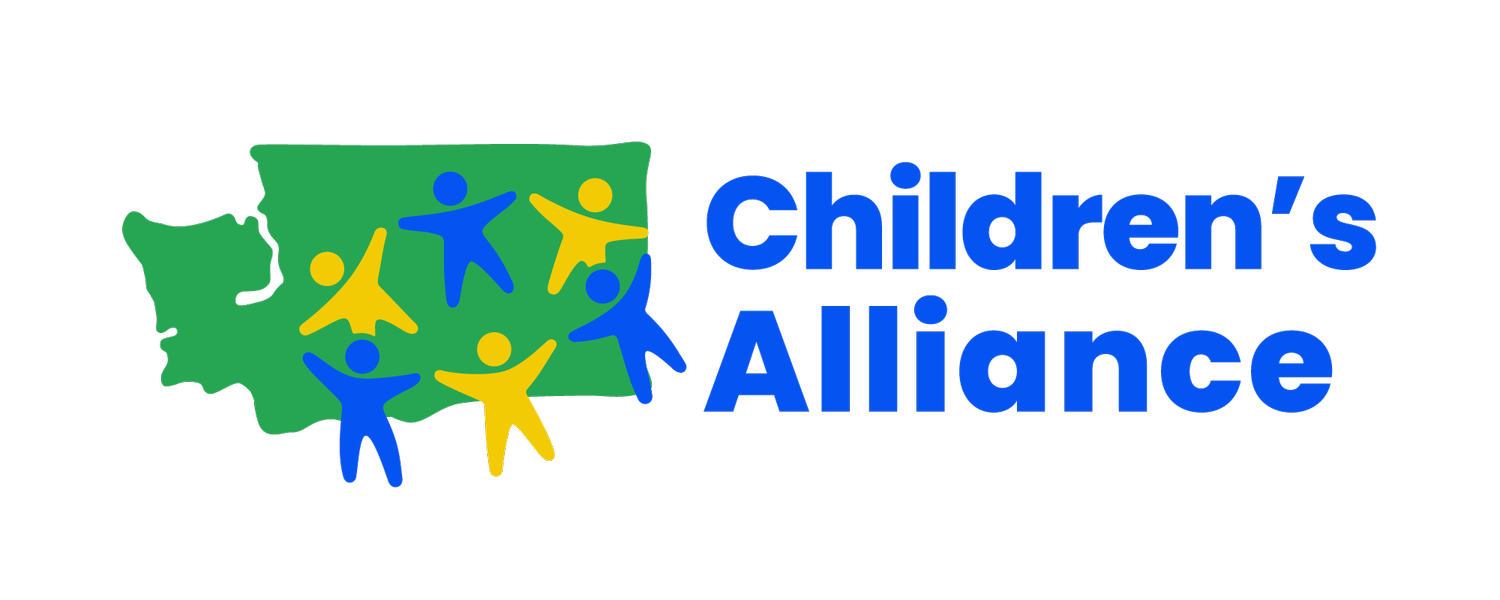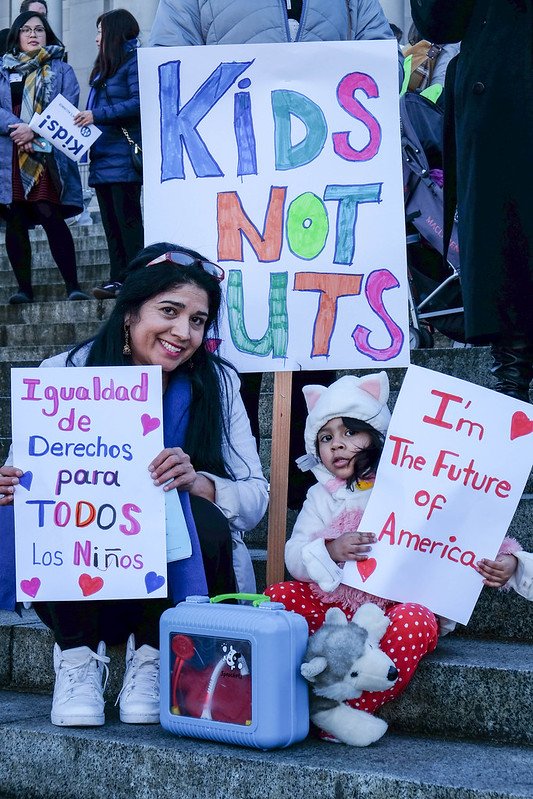OUR HISTORY
1983 – The Children’s Alliance is formed
Actually, we were called the Alliance for Children, Youth, and Families back when three organizations came together to create one, unified, statewide voice for kids.
1986 – First profile of minority children in poverty
The Children’s Alliance published “A Profile of Minority Children in Poverty,” the first of a series of reports to focus a spotlight on the state’s failure to serve children of color equitably.
1993 – No more corporal punishment in public schools
It took us nine years to win this law, but in 1993 punishment by ruler finally went the way of the horse-drawn carriage.
1986 – Education for detained youth, mental health services, and a new state focus on children and families
Three years of persistent lobbying resulted in the state providing education for troubled youth in juvenile detention. Also, we won the first state set-aside funding for children’s mental health services and early childhood education for migrant children. We also pressed for the establishment of the children and family services division within the Washington Department of Social & Health Services.
1995 – Kids get their own fighter in Olympia: the Ombudsman for Families and Children
The tragic death of 4-year-old Lauria Grace from child abuse inspired the Alliance to spearhead an effort to create a new independent investigative office at the Department of Social and Health Services, the Ombudsman for Families and Children. Having someone to look out for kids and only kids has saved children's lives in Washington.
1989 – Children’s Budget Coalition and Children’s Campaign Fund are born
When shrinking revenues made budget cuts inevitable we led an Initiative campaign to raise new revenue for children. The Initiative failed, but only at the ballot. As a result of the campaign the Children’s Budget Coalition was formed to push for making kids a budget priority in Olympia.
1994 – Hello, Spokane, and food for the hungry
We opened an office in Spokane and children's advocates in that region came together to heighten awareness of the needs of kids. In Olympia, we cut red tape in the food stamp program, leading to 100,000 more hungry families around the state getting food assistance.
1995-1997 – Feed the children!
In 1995, the Children’s Alliance lobbied successfully for $5 million in new funds, called Meals for Kids, to support school and community meal programs. Two years later we saved food stamps for 40,000 immigrants from cuts by Congress and secured $125,000 in start-up funds for Summer Food programs.
1998 – Giving troubled youth places to call home
When the city of Bellevue refused to allow new group homes for troubled youth to break ground in their residential areas, the Children’s Alliance filed a lawsuit that brought national attention and set an important statewide and national precedent. Today, group homes operate in Bellevue.
1999 – Sticking up for families on welfare
As welfare reform discussions unfairly made a target of those in need, the Children’s Alliance successfully pushed for new state budget language that required welfare reform to be measured by its ability to reduce poverty, not merely reduce the number of families on the rolls. After welfare reform, 90,000 families, including 40,000 children, were illegally cut from health insurance, even though they were still eligible. We fought, threatening a lawsuit, until their health care was reinstated.
1999 – Children’s advocacy enters the digital age
From its humble beginnings as a phone tree, then a fax-driven alert system, the Children’s Action Network entered the digital age. We also developed a web-based tool called Parent Power to connect families to services that help them make ends meet for their children. In 2002, the nonprofit WithinReach took over operation of this online tool and renamed it ParentHelp123.
2004 – An Act for Hungry Families
The Children’s Alliance successfully led efforts in Olympia to get the Act for Hungry Families passed. The act gave more money to support school lunch and summer meals, gave people leaving welfare five months of transitional food stamps and made nonviolent ex-felons who have paid their debt to society eligible for food stamps to help themselves and their families re-enter society.
2002 – Putting the brakes on a bad move to centralize reports of child abuse
In late 2002, the Department of Social and Health Services centralized child abuse reporting at a call center in Seattle. Six weeks later, the state announced that the system would revert to local control—a victory for the safety of children.
2006 – Early learning now!
The Children’s Alliance launched its effort to bring together early learning advocates to speak with a united voice in Olympia. In 2006, the Children’s Alliance supported creation of a cabinet-level Department of Early Learning and a rating system for child care centers. In 2008, the coalition, staffed by the Children’s Alliance, became the Early Learning Action Alliance.
2007 – With Apple Health for Kids, Washington becomes a national leader in children’s health coverage
The Children’s Alliance played a key role in establishing Washington’s landmark policy that all children should have affordable and appropriate health coverage. The Cover All Kids bill, signed into law March 13, 2007, created Apple Health for Kids and made Washington a national leader in children’s health care.
2010 – Strategic Plan calls for greater focus on racial equity
Our new strategic plan calls for building a movement for children in Washington and creates an even sharper focus on poverty and racial equity.
1997 – Help paying for child care
We secured child care subsidies for all low-income families, not just those on public assistance, a benefit for 60,000 children every month.
1998 – Children’s Alliance joins attorneys for the children in a lawsuit for kids in foster care
Kids were sleeping on the floors of welfare offices and getting bounced from foster home to foster home. So the Children’s Alliance helped attorneys bring a lawsuit against the state demanding better treatment for the thousands of kids in foster care. Over the past decade, the lawsuit has been settled, an oversight panel formed, and specific benchmarks for improvement set.
1999 – HOPE for homeless youth
The Children’s Alliance pushed for the HOPE Act, which provided new services for homeless youth, including short-term residential centers and support services to help homeless teens get education, treatment and a long-term place to live.
2003 – Saving prenatal care for immigrant women
With a budget crisis to fix and anti-immigrant sentiment on the rise, the 2003 Senate budget writers proposed eliminating prenatal care for 12,000 undocumented women from the state budget. The Children's Alliance mobilized our members to contact their legislators and held a press conference with other health care advocates to say, “Hands off prenatal care!”
2001 – The real facts of life for children of color
As a follow up to our 1986 report about children of color in Washington, we co-authored a landmark report, “The Real Facts of Life for Children of Color,” that resulted in local initiatives in King and Spokane counties to close the educational achievement gap and address other inequities.
2004 – Children’s Action Network moves up in the electronic world
With a far more sophisticated and powerful electronic system at its disposal, the Children’s Alliance helped thousands more advocates get timely messages to their lawmakers in Olympia. Since then, our online membership has grown to approximately 9,000 members.
2007 – Addressing racial disproportionality in the child welfare system
Through the legislature, we helped secure a six-year state commitment to act on disparities for children of color in our child welfare system. Children’s Alliance Executive Director Paola Maranan sits on the statewide Washington State Racial Disproportionality Advisory Committee, charged with assessing the problem statewide and offering solutions.
2006 – Serving up millions more free breakfasts to hungry kids
The Children’s Alliance joined together with our allies in the state’s child nutrition office to get rid of the co-pay some low-income children had to pay for school breakfast. The result? Two million more free breakfasts were served to hungry kids at school.
2011 – Fighting cuts that target children of color
The Children’s Alliance joined with allies to fight back against budget cuts that target children and communities of color. While lawmakers made some decisions that dimmed the prospect of a brighter future for our children, smart and persistent advocacy lessened the damage to kids.
2008 – Helping families put food on the table
Working with our allies in the state Senate, the Children’s Alliance supported legislation to raise the gross income limit for Basic Food (Washington’s food stamp program.) The increase we won was expected to make food stamps available to an additional 23,000 households.
2009 – Protecting kids from the damage of the recession
In a tough legislative session marked by falling tax revenue and state budget cuts, the Children’s Alliance pulled out the stops and used strategic advocacy, communications and mobilization to protect health care and food assistance for children and families.
2012 – Protecting what works, rejecting unfair cuts, and adopting new solutions
As the recession continued, the Children’s Alliance, working with our members and allies, was able to blunt proposed budget cuts to programs meant to support children and families through hard times. We pushed policymakers to restore Working Connections Child Care for working parents to 2010 levels, staved off elimination of the State Food Assistance program for documented immigrants, and protected Apple Health for Kids from cuts.
2015 – Unprecedented new policies and investments in early learning
Guided by our leadership and racial equity analysis, state lawmakers passed the historic, bipartisan Early Start Act to create quality early learning opportunities for all children.
2017 – Shaping the Department of Children, Youth and Families
When Governor Jay Inslee proposed to consolidate several disparate state programs and services into a single, cabinet-level Department of Children, Youth and Families, we recognized a singular chance to infuse the new department with a mission-level commitment to racial equity and healthy development for all kids. Lawmakers listened, working to incorporate our four key priorities into the creation of the new department.
2018 – Pushing back on public charge
We gathered allies across Washington state to fight the Trump Administration’s cruel “public charge” proposal to discourage immigrant families from accessing health care, WIC, Head Start and other services. Together, we helped communities statewide issue thousands of letters in opposition to Trump’s plan—part of a nationwide campaign that brought forth more than a quarter million comments. The flood of written opposition slowed down the rulemaking process, maintaining access to crucial services for the 1 in 4 Washington kids growing up in immigrant families.
2019 – Full Family Health Coverage
Knowing that health care for all family members improves outcomes among kids, we helped mobilize the collective strength of Pacific Islander communities from Spokane to Lacey in order to create COFA Islander Health Care in 2018. The next year, we pushed lawmakers to make the program fully resemble the benefits offered under Apple Health. The addition of dental coverage gives thousands of Pacific Islander families equitable access to care; that’s progress in the effort to ensure every Washington family has the fundamental services it needs to stay strong.
2021 – Landmark Investments in Early Learning
Working together with advocates and organizational partners, we helped pass the Fair Start for Kids Act (SB 5237), representing the largest investment in early learning in state history. This legislation takes a comprehensive approach to affordability and access to early learning, with dramatic new investments in Working Connections Child Care, quality pre-K, home visiting and other programs of support for families with young children. Designed to promote equity, the act creates additional supports for culturally and linguistically diverse early learning. Some aspects of the act have already come into effect, and we will continue monitoring its implementation to ensure that the law is used to erase the barriers that all kids face to a bright and healthy future.





